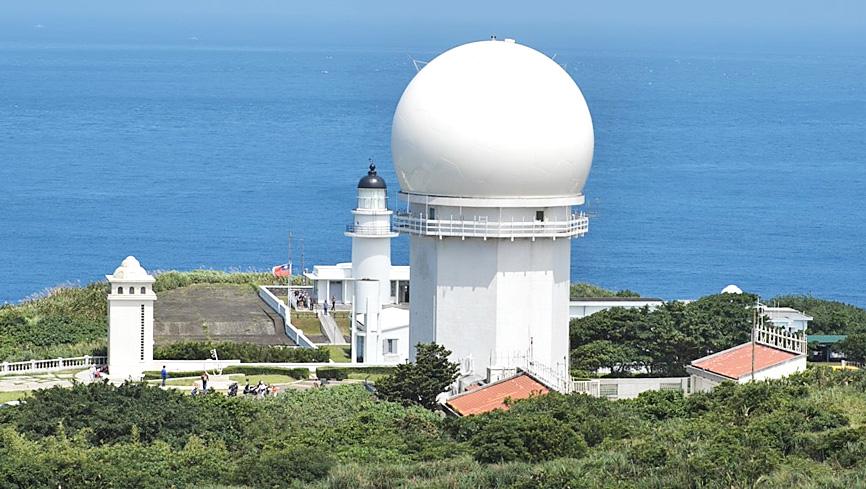The Civil Aeronautics Administration (CAA) is to activate two new long-range radar systems by the end of the year to monitor the nation’s airspace, it said on Wednesday.
The systems — which are installed in Cape Santiago (三貂角) and Oluanpi (鵝鑾鼻), in the easternmost and southernmost points of Taiwan proper respectively — were installed to meet an increase in civil aviation flights over the past few years through the Taipei Flight Information Region, which is an important aviation hub for East Asia, the agency said.
The nation’s current long-range radar systems have been in service for more than 20 years, and while they are regularly maintained, it has become increasingly difficult to find replacement parts and to keep up with maintenance costs, it said.

Photo courtesy of the Civil Aeronautics Administration
In 2019, the CAA was allocated NT$676 million (US$24.1 million) to upgrade aviation radar systems. For the long-range radar upgrades, the agency installed a new primary surveillance radar system, while ensuring that the secondary surveillance radar system is equipped with Mode S functionality, which allows selective interrogation of aircraft according to a unique 24-bit address assigned by the International Civil Aviation Organization.
The CAA encountered many challenges dismantling the long-range radar system at Cape Santiago, which is on a mountaintop, it said.
The circuitous mountain route made it difficult for large construction vehicles to access the radar station, and construction crews could only transport three large radome panels from the station at a time, it added.
The COVID-19 pandemic presented additional issues, such as uncertainty over the timing in receiving components and technical specialists from overseas, the agency said.
As the new radar system is 32.3m tall, construction would need to stop during the northeast monsoon or a strong wind, it said.
The CAA is testing the long-range radar systems, which involves parameter adjustments, an on-site acceptance test and a 30-day confidence test.
The long-range radar systems are built using 101 panels, with each system weighing 5.2 tonnes, the CAA said, adding that the radomes’ bases are coated with special paint to prevent corrosion.
The agency’s Air Navigation and Weather Services have 11 radar systems across the nation, including nine terminal area radar systems and two long-range radar systems.
The primary radar system is capable of detecting flights within 200 nautical miles (370.4km), with a surveillance capacity of 1,000 flights.
The secondary radar system can detect flights within 250 nautical miles, with a surveillance capacity of 500 flights.

TRAGEDY: An expert said that the incident was uncommon as the chance of a ground crew member being sucked into an IDF engine was ‘minuscule’ A master sergeant yesterday morning died after she was sucked into an engine during a routine inspection of a fighter jet at an air base in Taichung, the Air Force Command Headquarters said. The officer, surnamed Hu (胡), was conducting final landing checks at Ching Chuan Kang (清泉崗) Air Base when she was pulled into the jet’s engine for unknown reasons, the air force said in a news release. She was transported to a hospital for emergency treatment, but could not be revived, it said. The air force expressed its deepest sympathies over the incident, and vowed to work with authorities as they

A tourist who was struck and injured by a train in a scenic area of New Taipei City’s Pingsi District (平溪) on Monday might be fined for trespassing on the tracks, the Railway Police Bureau said yesterday. The New Taipei City Fire Department said it received a call at 4:37pm on Monday about an incident in Shifen (十分), a tourist destination on the Pingsi Railway Line. After arriving on the scene, paramedics treated a woman in her 30s for a 3cm to 5cm laceration on her head, the department said. She was taken to a hospital in Keelung, it said. Surveillance footage from a

BITTERLY COLD: The inauguration ceremony for US president-elect Donald Trump has been moved indoors due to cold weather, with the new venue lacking capacity A delegation of cross-party lawmakers from Taiwan, led by Legislative Speaker Han Kuo-yu (韓國瑜), for the inauguration of US president-elect Donald Trump, would not be able to attend the ceremony, as it is being moved indoors due to forecasts of intense cold weather in Washington tomorrow. The inauguration ceremony for Trump and US vice president-elect JD Vance is to be held inside the Capitol Rotunda, which has a capacity of about 2,000 people. A person familiar with the issue yesterday said although the outdoor inauguration ceremony has been relocated, Taiwan’s legislative delegation has decided to head off to Washington as scheduled. The delegation

Another wave of cold air would affect Taiwan starting from Friday and could evolve into a continental cold mass, the Central Weather Administration (CWA) said yesterday. Temperatures could drop below 10°C across Taiwan on Monday and Tuesday next week, CWA forecaster Chang Chun-yao (張竣堯) said. Seasonal northeasterly winds could bring rain, he said. Meanwhile, due to the continental cold mass and radiative cooling, it would be cold in northern and northeastern Taiwan today and tomorrow, according to the CWA. From last night to this morning, temperatures could drop below 10°C in northern Taiwan, it said. A thin coat of snow